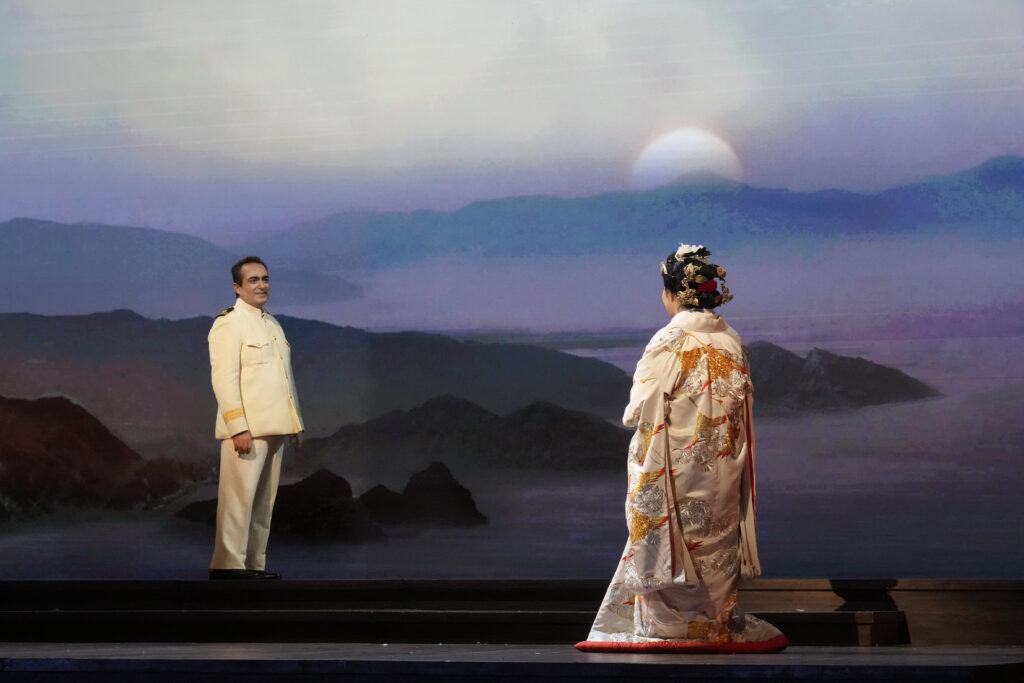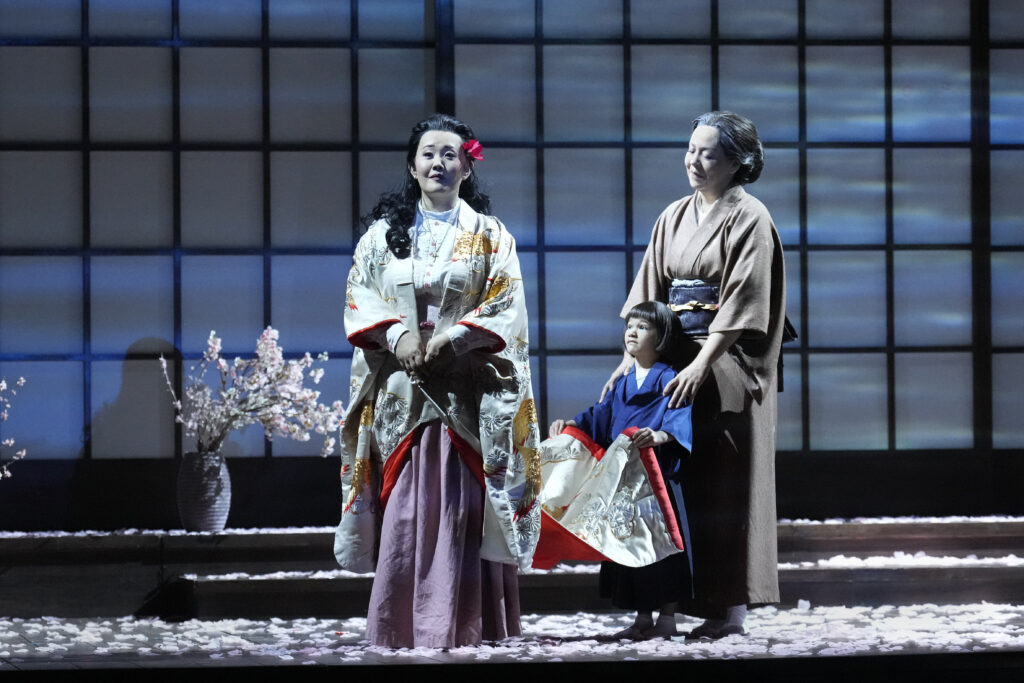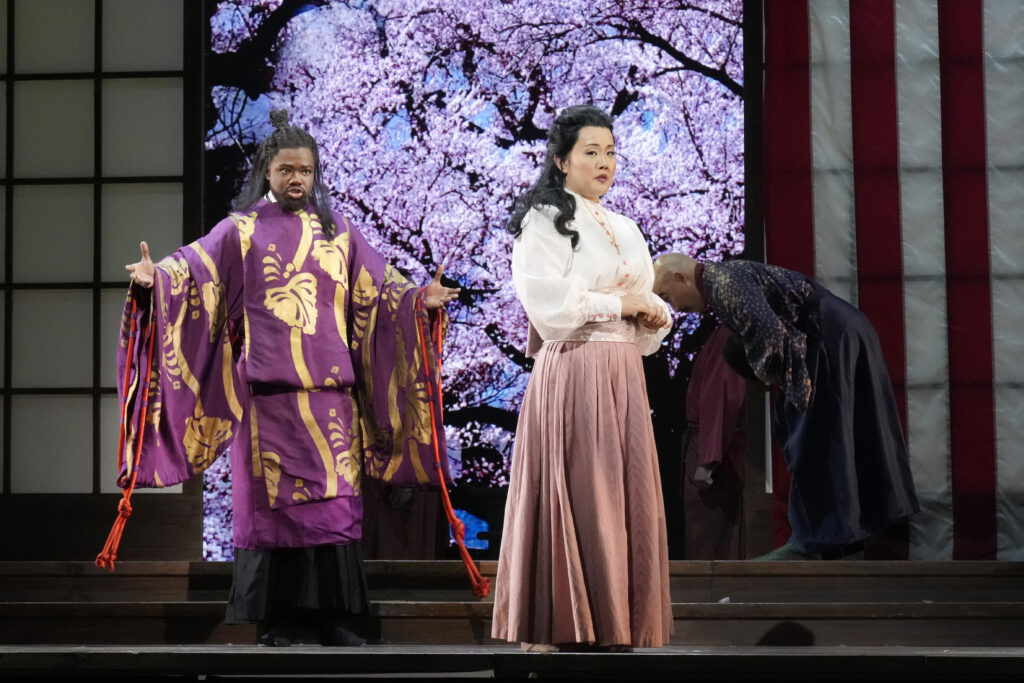There was palpable electricity in the air this past Saturday, as the Atlanta Opera unveiled its 2022-23 mainstage season with the first of four performances of Puccini’s Madama Butterfly, a production originally intended to open the 2020-2021 season but was one of the many casualties of delays associated with the Covid pandemic. The memorable evening witnessed the revival of the much-admired Madama Buttefly production first seen in 2014, an occasion which also marked Tomer Zvulun’s innagural season as Artistic Director and cemented his collaboration with the late maestro Lorin Maazel, for whom these performances are dedicated. A glittery audience filled the confines of the Cobb Energy Center for the Performing Arts in pre-pandemic numbers (spotted amongst them was the new Consulate General of Japan Mio Maeda and former Atlanta Mayor Shirley Franklin) and greeted the company’s efforts with thunderous applause.

In reviving this production eight years after its premiere, Mr. Zvulun and his design team have made subtle revisions to the visual elements. Edhard Rom’s projection and video backdrops, depicting the home’s exquisite garden and other naturalistic settings, have become further integrated with his physical sets and Allen Charles Klein’s costumes to produce one of the finest traditional productions of the opera to be experienced today. For his part, Mr. Zvulun has filled in some of the blanks to aid the audience along. A projected Roosevelt quote proclaiming a nautical manifest destiny in the Pacific helps set the socio-political climate of the era which permeates the narrative and further explain Pinkerton’s involvement in the drama. Some gambles, such as the sudden of young Sorrow running across the stage as if in mid-play had a devastating effect, while Suzuki’s overhearing of Pinkerton’s ultimate plans in Act I and his meeting of his son during the opera’s final trio will alter the audience’s emotional response depending on who you ask, while remaining innovations, primarily those providing unnecessary aid to straight musical stretches (the fluttering butterflies accompanying the opera’s brief orchestral introduction and the depiction of Pinkerton’s ship projected superimposed against the orchestral intermezzo that links the two big scenes in Act II,) remained superfluous – sometimes it is ok for the eye to let the ear take over.
Taking over Music Director Arthur Fagen’s place at the pit, young maestro Timothy Myers negotiated the difficult score admirably. A protege of the late Lorin Maazel, his execution was prim and often distinguished by a brisk tempo which emphasized his fresh interpretation of this familiar music. His handling of the Act I concertato in particular (performed in its original form for these performances) was noteworthy for its clarity and congenial phrasing. If a subtle musical tug-of-war between the pit and the evening’s leading tenor called out a need for more amicable flexibility in the maestro’s tempo structure (who incidentally remained steadfast,) it was quickly resolved by the time the leading prima donna settled into her entrance.
Making her debut in these performances of Madama Butterly, Japanese soprano Yasko Sato brings to Atlanta her celebrated assumption of Puccini’s tragic heroine. Her Cio-Cio-San is an important, carefully curated creation, replete with nuances designed to convey the character’s innocent fascination (the insistent way her gaze follows Pinkerton across the stage in Act I, for instance) and contrasted with her willful renunciation of her cultural heritage for the love of a man who truly does not deserve it. The offstage family protests coupled with her anxious retorts of “Butterfly – Rinnegata…e felice” were delivered to their full impact. Coupled with the political climate of 2022, it resonated with greater relevance.
The opera’s marathon second act became an emotionally excruciating experience for the audience as Ms. Sato’s Cio-Cio-San’s hope, faithful devotion and unwavering love (the very factors driving her forward,) became corrupted by a harsh world to instigate her undoing. And yet, so much life was lived as the character willfully strategizes to deceive herself. These culminated with Ms. Sato’s tense and tentative exchanges with Suzuki following Pinkerton’s return, and the careful inspection of her crucifix as the weight of the truth and her sacrifice loomed over her prompted profound silence in the audience. The final reclamation of her heritage served as silver lining to her tragic demise.

It is noteworthy to point out that, as heard on Saturday, Ms. Sato’s heartfelt stage portrayal was not equally supported through vocal means. Her soprano at times qualified as that of the lirico spinto designation, though it was wielded through a disparate method consistently at odds with the demands of the score. The voice is of significant size, best heard in the warm and amber tones of her middle register when exposed to low pressure situations. Perhaps an issue of stamina, the sustained melodies which crown Cio-Cio-San’s famous entrance were solidly delivered up through the confession to Pinkerton of her secret conversion to Christianity (“Ieri son salita”). From then on, a constricted production in the upper passagio marred subsequent stabs at the higher tessitura, which became harsh and strident, threatening veritable grief in the important climatic moments that followed. The lack of technical support rendered her phrasing perfunctory and limited her freedom to express herself musically to her fullest potential, a real shame as she is a pupil of the great Raina Kabaivanska, one of the last great exponents of the role in the 20th century.
Gracing the Atlanta Opera stage as Pinkerton, Italian tenor Gianlucca Terranova delivered another winning portrayal to accompany his previous triumphs as Bizet’s Don Jose and Puccini’s Rodolfo and Calaf. He imbued Pinkerton’s music with that welcomed idiomatic Italianate treatment that has qualified him as a favorite with Atlanta audiences in previous seasons. In the past seven years, the voice has retained its bronze hue and tight knit even through the most climatic passages, though the ascent to the high fortissimo is now aided through a distinct focus which contrasts the rest of his technique. Voice change and methods change with it. In the interim, he fully milked his three solos and his participation in the opera’s extraordinary love duet all the while delivering the stereotypical Pinkerton needed to inspire the disdain of the audience. The playful jeers mixed with the ovation that greeted his curtain gave sufficient notice of his success.
Returning to Atlanta in the role that marked her debut back in 2014, Nina Yoshida Nelsen’s interpretation of Suzuki has further developed into the protective and caring maid essentially turned extended family as Cio-Cio-San awaits Pinkerton’s return. Vocally, her mezzo-soprano has retained its sympathetic mellow tone while her declamation has gained a welcomed newfound authority. She shared supporting credits with the fine Sharpless of bass-baritone Craig Colclough, who’s smashing debut in the title role of Mozart’s The Marriage of Figaro remains vivid in our recollection seven years after the fact. Like in the case of Ms. Nelsen’s, though the core qualities of Mr. Colclough’s instrument and stylistic approach is not ideally suited for Italian verismo, he nonetheless succeeded in delivering a diplomatic and sensible reading of the American consul Sharpless. These fine singers, together with Mr. Terranova, joined their substantial talents to deliver a beautiful rendition of the opera’s final ensemble, “Io so che alle sue pene”.

The comprimario assignments were exceptionally cast, with this performance providing us with an update on the vocal condition of baritone Leroy Davis, whom we last heard as Ernesto in Odyssey Opera’s presentation of Pacini’s rare work “Maria, Regina d’Inghilterra back in 2019 (you know, before everything went to hell). Back then we wondered if the young artist’s voice would catch up with his technique. Heard here as Prince Yamadori, we are happy to report tremendous progress in projection and core development. In the key role of Goro, tenor Julius Ahn enthusiastically graced his involvement with apparent inexhaustible resources and the role of Kate Pinkerton, so often delegated to a deserving chorus member, allowed the full and vibrant mezzo-soprano Gretchen Krupp, a Glynn Studio Artist, to enter our radar.
There are three remaining performances of Puccini’s Madama Butterfly. For more information on there, and the rest of the company’s blockbuster 2022-2023 season which will include performances of Mozart’s Don Giovanni, Bernstein’s Candide and Wagner’s Das Rheingold, visit www.atlantaopera.org
-Daniel Vasquez